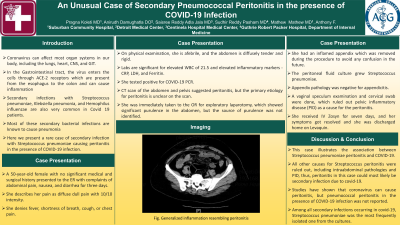Tuesday Poster Session
Category: Small Intestine
P4172 - An Unusual Case of Secondary Pneumococcal Peritonitis in the Presence of COVID-19 Infection
Tuesday, October 24, 2023
10:30 AM - 4:00 PM PT
Location: Exhibit Hall

Has Audio
- PK
Pragna Koleti, MD
Suburban Community Hospital
Norristown, Pennsylvania
Presenting Author(s)
Anirudh Damughatla, DO1, Mathew Mathew, MD2, Pragna Koleti, MD2, Saisree Reddy Adla Jala, MD3, Sudhir Reddy. Pasham, MD4
1Detroit Medical Center/Wayne State University, Detroit, MI; 2Suburban Community Hospital, Norristown, PA; 3Centinela Hospital Medical Center, Los Angeles, CA; 4Guthrie Robert Packer Hospital, Sayre, PA
Introduction: Coronavirus can affect most organ systems in our body, including the lungs, heart, CNS, and GIT. In the Gastrointestinal tract, the virus enters the cells through ACE-2 receptors which are present from the esophagus to the colon and can cause inflammation. Secondary infections with Streptococcus pneumoniae, Klebsiella pneumonia, and Hemophilus influenzae are also very common in Covid 19 patients. Most of these secondary bacterial infections are known to cause pneumonia. Here we present a rare case of secondary infection with Streptococcus pneumoniae causing peritonitis in the presence of COVID-19 infection.
Case Description/Methods: A 50-year-old female with no significant medical and surgical history presented to the ER with complaints of abdominal pain, nausea, and diarrhea for three days. She describes her pain as diffuse dull pain with 10/10 intensity. She denies fever, shortness of breath, cough, or chest pain. On physical examination, she is afebrile, and the abdomen is diffusely tender and rigid. Labs are significant for elevated WBC of 21.5 and elevated inflammatory markers - CRP, LDH, and Ferritin. She tested positive for COVID-19 PCR. CT scan of the abdomen and pelvis suggested peritonitis, but the primary etiology for peritonitis is unclear on the scan. She was immediately taken to the OR for exploratory laparotomy, which showed significant purulence in the abdomen, but the source of purulence was not identified. She had an inflamed appendix which was removed during the procedure to avoid any confusion in the future. The peritoneal fluid culture grew Streptococcus pneumoniae. Appendix pathology was negative for appendicitis. A vaginal speculum examination and cervical swab were done, which ruled out pelvic inflammatory disease (PID) as a cause for the peritonitis. She received IV Zosyn for seven days, and her symptoms got resolved. She was discharged home on Levaquin.
Discussion: This case illustrates the association between Streptococcus pneumoniae peritonitis and COVID-19. All other causes for Streptococcus peritonitis were ruled out, including intraabdominal pathologies and PID, thus, peritonitis in this case could most likely be secondary infection due to covid-19. Studies have shown that coronavirus can cause peritonitis, but pneumococcal peritonitis in the presence of COVID-19 infection was not reported. Among all secondary infections occurring in covid-19, Streptococcus pneumoniae was the most frequently isolated one from the cultures.

Disclosures:
Anirudh Damughatla, DO1, Mathew Mathew, MD2, Pragna Koleti, MD2, Saisree Reddy Adla Jala, MD3, Sudhir Reddy. Pasham, MD4. P4172 - An Unusual Case of Secondary Pneumococcal Peritonitis in the Presence of COVID-19 Infection, ACG 2023 Annual Scientific Meeting Abstracts. Vancouver, BC, Canada: American College of Gastroenterology.
1Detroit Medical Center/Wayne State University, Detroit, MI; 2Suburban Community Hospital, Norristown, PA; 3Centinela Hospital Medical Center, Los Angeles, CA; 4Guthrie Robert Packer Hospital, Sayre, PA
Introduction: Coronavirus can affect most organ systems in our body, including the lungs, heart, CNS, and GIT. In the Gastrointestinal tract, the virus enters the cells through ACE-2 receptors which are present from the esophagus to the colon and can cause inflammation. Secondary infections with Streptococcus pneumoniae, Klebsiella pneumonia, and Hemophilus influenzae are also very common in Covid 19 patients. Most of these secondary bacterial infections are known to cause pneumonia. Here we present a rare case of secondary infection with Streptococcus pneumoniae causing peritonitis in the presence of COVID-19 infection.
Case Description/Methods: A 50-year-old female with no significant medical and surgical history presented to the ER with complaints of abdominal pain, nausea, and diarrhea for three days. She describes her pain as diffuse dull pain with 10/10 intensity. She denies fever, shortness of breath, cough, or chest pain. On physical examination, she is afebrile, and the abdomen is diffusely tender and rigid. Labs are significant for elevated WBC of 21.5 and elevated inflammatory markers - CRP, LDH, and Ferritin. She tested positive for COVID-19 PCR. CT scan of the abdomen and pelvis suggested peritonitis, but the primary etiology for peritonitis is unclear on the scan. She was immediately taken to the OR for exploratory laparotomy, which showed significant purulence in the abdomen, but the source of purulence was not identified. She had an inflamed appendix which was removed during the procedure to avoid any confusion in the future. The peritoneal fluid culture grew Streptococcus pneumoniae. Appendix pathology was negative for appendicitis. A vaginal speculum examination and cervical swab were done, which ruled out pelvic inflammatory disease (PID) as a cause for the peritonitis. She received IV Zosyn for seven days, and her symptoms got resolved. She was discharged home on Levaquin.
Discussion: This case illustrates the association between Streptococcus pneumoniae peritonitis and COVID-19. All other causes for Streptococcus peritonitis were ruled out, including intraabdominal pathologies and PID, thus, peritonitis in this case could most likely be secondary infection due to covid-19. Studies have shown that coronavirus can cause peritonitis, but pneumococcal peritonitis in the presence of COVID-19 infection was not reported. Among all secondary infections occurring in covid-19, Streptococcus pneumoniae was the most frequently isolated one from the cultures.

Figure: Generalized inflammation resembling peritonitis
Disclosures:
Anirudh Damughatla indicated no relevant financial relationships.
Mathew Mathew indicated no relevant financial relationships.
Pragna Koleti indicated no relevant financial relationships.
Saisree Reddy Adla Jala indicated no relevant financial relationships.
Sudhir Pasham indicated no relevant financial relationships.
Anirudh Damughatla, DO1, Mathew Mathew, MD2, Pragna Koleti, MD2, Saisree Reddy Adla Jala, MD3, Sudhir Reddy. Pasham, MD4. P4172 - An Unusual Case of Secondary Pneumococcal Peritonitis in the Presence of COVID-19 Infection, ACG 2023 Annual Scientific Meeting Abstracts. Vancouver, BC, Canada: American College of Gastroenterology.
